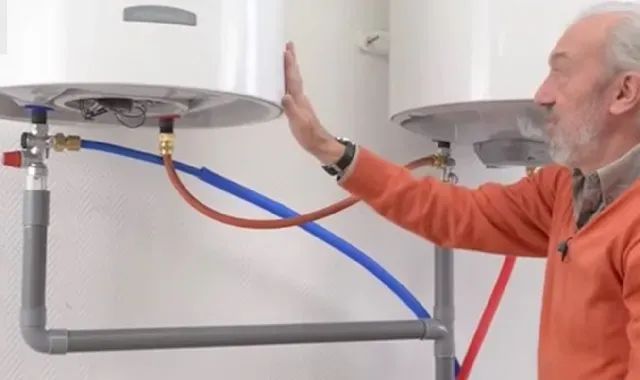Causes of an electric water heater explosion and how to avoid them: A guide to staying away from serious problems
As the use of electric water heaters increases in the winter, the risk of explosion and gas leakage also increases, posing a serious threat to the safety of the home and its residents. This article focuses on the common habit that poses a major threat to water heaters, which is leaving them plugged in while showering. We will reveal the details of this dangerous habit and provide practical advice to prevent a water heater explosion and address potential problems, as the secret of safety lies in awareness and caution.

The factors that lead to the explosion of water heaters are varied, but there is a secret that is evident in a common habit among women, a warning from the British “grovehvac” website. This secret lies in leaving the heater connected to the electricity while showering, which leads to high temperatures and internal pressure, and results in an explosion that may be dangerous.
Dangerous habit: leaving the heater connected while showering
The common habit that causes the heater to explode is to leave it plugged in while showering. As temperatures and pressures rise, water vapor is created which can cause flames to break out and the heater to explode. This habit is a major source of risk and should therefore be avoided to maintain the safety of the home.
Warning signs: How do you know that the heater is in danger?
To recognize warning signs of a heater explosion, you must pay attention to several signs, including:
1. High temperature and pressure
When pressure and temperature rise abnormally, these can be early signs of a heater explosion.
2. Temperature leakage and pressure relief valve
The condition of the pressure relief valve must be monitored. If there is a leak, this indicates that the component is unable to handle the internal tank pressure.
3.T&P valve defects
The T&P valve is a vital part, and any defect can result in high temperatures and increased pressure.
How do you avoid the danger of a gas heater?
Even if the heater does not explode, a gas leak can occur, posing a health threat. To avoid this danger, follow the following tips:
1. Ensure ventilation
Make sure there are ventilation holes during showering to ensure air circulation.
2. Do not close the windows completely
To avoid suffocation, bathroom windows should not be completely closed to ensure air circulation.
3. Installing a hood
Install a hood in the bathroom to improve ventilation and reduce the chances of leakage.
4. Immediate response
If you feel suffocated or overwhelmed, get out of the bathroom immediately to avoid health risks.
By following these guidelines, you can keep your water heater safe and avoid dangerous habits that could lead to it exploding. Make sure to adhere to these tips to keep your home and family members safe.
Water Heater Explosion Prevention: Maintaining Performance and Safety
To ensure that your water heater operates safely and efficiently, some preventive measures can be taken to prevent potential problems:
1. Periodic maintenance
Perform regular maintenance on the water heater, and make sure to clean the sediment accumulated at the bottom of the tank. This prevents buildup that can lead to high temperatures and high pressure.
2. T&P valve check
Check the pressure relief valve regularly, and make sure there is no leakage. If there are any defects, it may be necessary to replace it immediately.
3. Temperature setting:
Adjust the water heater temperature to a safe level, preferably no more than 120°F (48°C).
4. Call a qualified technician:
In case of doubts or signs of heater malfunction, including gas leakage, a qualified technician should be contacted immediately for inspection and maintenance.
5. Periodic cleaning:
Clean the vents and hood regularly to ensure proper air circulation and avoid unwanted build-up.
6. Avoid leaving the heater running:
Avoid leaving the heater connected to electricity while showering. Wait until it stops completely before leaving the bathroom.
Maintaining the safety of the water heater is not only the homeowner's responsibility, but requires cooperation and personal commitment. When you follow preventive steps and perform regular maintenance, you can reduce the risk of your water heater exploding and ensure its continued performance safely. Make sure to spread awareness about this issue among your family members and the surrounding community, as small improvements in daily behaviors can make a big difference in your safety and the safety of others.
Keywords:( Most searched on Google )
